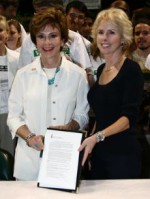USF discusses options for going greener

After USF President Judy Genshaft obliged the University to fight global warming by signing the American Colleges and Universities Presidents Climate Commitment (ACUPCC) on April 12, USF is determining how to meet that commitment.
Linda M. Whiteford, associate vice president for academic affairs and strategic initiatives, said she hopes to create a “sustainability steering committee” – made up of faculty, staff and students – to guide the University toward a tangible plan for reducing emissions. The committee will meet after this semester.
“(The administration) agreed that even if it costs money, it’s the right thing to do,” Whiteford said.
Sharon Hanna-West, Exide distinguished lecturer of ethics and sustainability at the College of Business, said that even though the University would need to spend money to become energy efficient, it would eventually save money.
The commitment is voluntary and does not have a system of checks to ensure that the University continues to meet its standards. However, USF will send status reports to the APCUCC’s steering committee, and Whiteford said she would take personal responsibility for making sure the University sticks to its commitment.
“I will hold my own toes to the fire,” she said. “I will be the oversight.”
New to the Provost’s Office, Whiteford deals with “faculty initiatives” and is the point person at the University for sustainability, global initiatives, interdisciplinary inquiry and community engagement.
Ryan Iacovacci, a junior majoring in religious studies, said that the committee would be a good way to bridge the communication gap between the administration and students, but that making the right decisions will take more than one committee.
“It’s not up to any one committee to decide,” he said. “There needs to be multiple forms of outreach to engage students.”
Hanna-West said the commitment’s success will take more than just initiatives from the administration.
“It requires the whole community,” she said. “For this thing to work, the administration can’t do it by themselves.”
Hanna-West said many ideas have surfaced around campus about how to uphold the commitment, but none are set in stone.
“There’s been a lot of talk and a lot of various policies,” she said. “In terms of anything that’s been adopted officially, that’s to come.”
The University, however, made strides toward the commitment before signing, said Whiteford. She noted the presence of environmental groups on campus and faculty members who teach their students about sustainability.
“All those activities, they’re doing them on their own,” she said.
Some other strides the University has made include building a green Phyllis P. Marshall Center and establishing a mass transportation system – the Bull Runner. Others, such as better recycling programs and reduced carbon dioxide output, are goals yet to be reached.
Other ideas included parking cars farther away from the center of campus and encouraging students and faculty to take the bus or walk.
“Just park your car and walk,” Hanna-West said. “Try to carpool, take the bus.”
Whiteford said the administration should make the same sacrifices to uphold this commitment as students and faculty.
“Faculty and administrators would be challenged to say ‘I’ll leave my car off-campus,'” she said.
Both also discussed the possibility of closing some on-campus buildings overnight, so their lights could be shut off.
“It’s the quintessential conflict of individual needs and rights over group rights,” Whiteford said, explaining that a darker campus could be a safety issue but that turning off the lights would save a large amount of energy.
Hanna-West said that on one side there is a security issue, but on the other there is an environmental issue.
“Part of this is education, people,” she said. “We can’t hire an efficiency police to run after them.”
Iacovacci said that lights near the residence halls should be left on because there is a lot of student activity near the residence halls at night. Other buildings, however, should be locked up.
“If anyone is hanging out at Cooper (Hall) around midnight or 1 a.m., they need to get a life,” he said. “If you shut the lights off, people won’t go there.”
A decision like this would require much negotiation between various elements of the University and the students, Whiteford said.
“These decisions have to be made with leadership from the top and grassroots support,” she said.
If the University is to succeed in its plans to uphold the commitment, everyone needs to participate, both Hanna-West and Whiteford said.
Hanna-West stressed that in order for the University to succeed, individuals may need to put their personal comfort aside.
“Hopefully everyone will understand that some of these things have to be done,” she said.
Whiteford said she expects everyone to help make the University more sustainable.
“All of us, as individuals, will have to make sacrifices to make sustainability real,” Whiteford said.






